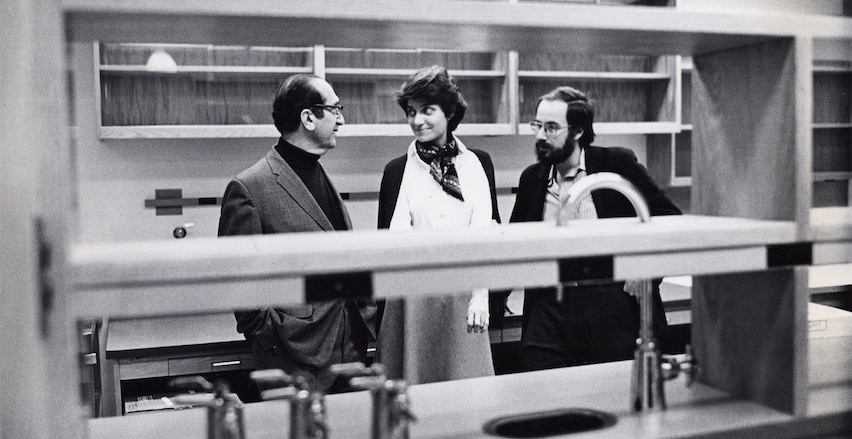
Salvador Luria, Nancy Hopkins, David Baltimore, ca. 1974
”By devoting ourselves to the study of cancer, we have made an implicit pact with people who suffer from cancer and people who contribute to cancer research. We must do our best to bring a new understanding to the cancer problem if we are to fulfill our side of the pact.“
David Baltimore, Founding Member, MIT Center for Cancer Research
Origins
MIT opened the doors to the Center for Cancer Research (CCR) in 1974, setting in motion an unprecedented era of progress in cancer research. While other institutions focused on near-term clinical problems, the Center sought to unmask the disease—about which virtually nothing was known—at its biological core. Under the leadership of Salvador Luria, the CCR sparked a revolution in cancer research, making enormous contributions to our understanding of the disease, including:
- Isolation of the first human cancer genes
- Discovery of split genes and RNA splicing in eukaryotic organisms
- Description of extracellular matrix components and their critical role in metastasis
- Identification of the molecules that led to two of the first FDA-approved molecularly targeted cancer drugs, Herceptin® approved in 1998 and Gleevec® approved in 2001
Beyond their importance in understanding the disease, these discoveries—and many others—laid the groundwork for new methods to treat and diagnose cancer.
Evolution
On October 9, 2007, MIT announced the launch of a major new initiative in cancer research, supported by a $100 million gift from MIT alum David H. Koch. As then-MIT President Susan Hockfield declared, "the David H. Koch Institute for Integrative Cancer Research will harness the power of MIT scientists and engineers to address one of the most pressing challenges to human health: the ultimate eradication of cancer, starting with real improvements in detection, treatment, and prevention.” The new state-of-the-art research facility was dedicated on March 4, 2011, coinciding with MIT’s 150th anniversary.
The new collaborative research model was the first to bring cancer biologists and chemists together with biological, chemical, mechanical, and materials science engineers, computer scientists, clinicians, and others to develop new insights into cancer, as well as new tools and technologies to better treat, diagnose and prevent the disease. Fresh perspectives and interdisciplinary approaches accelerated the development innovative platform technologies for cancer detection and treatment, novel materials for drug delivery and tumor monitoring, pioneering approaches to gene editing and cancer modeling, and systems-based approaches to assess the mechanisms of biological phenomena and drug response. Recent advances include:
- Design of an onco-fluorescent agent and hand-held imaging tool to improve surgical outcomes in breast cancer, now approved by the FDA
- Pioneering the use of gene editing and organoids for tumor modeling
- Design of delivery systems for RNA interference therapies to treat cancer and other diseases, and approved for vaccines against COVID-19 and other conditions
- Helped characterize a metabolic target unique to cancer cells, with a new drug, AG-221 (enasidenib), approved by FDA in 2017 for acute myeloid leukemia
- Tools for single cell analysis that improve accessibility of sequencing technologies, accelerate understanding of cellular networks, and help clinicians choose the most effective therapies for patients
- Maps of cell signaling pathways to identify interventions and drug combinations that improve outcomes for patients with prostate, triple negative breast, and other cancers
- Development of nanoparticle “hitchhiking” vaccines, currently in clinical testing, that stimulate T cells to attack tumors
- Creation of machine learning tools to accurately assess risk of breast and other cancers
Future
Rooted in MIT’s vibrant culture of discovery and innovation, the Koch Institute for Integrative Cancer Research now serves as a model for other cancer centers across the country and around the world. Our interdisciplinary approach truly harnesses the best of MIT science and engineering, allowing people from all backgrounds to shape new futures in cancer research.
As we look ahead to the Koch Institute’s next ten years, we continue to build on technological and scientific knowledge developed by our predecessors, while confronting today’s most pressing cancer challenges. Big data, machine learning, and AI are allowing us to evaluate patient and pre-clinical data in ways we never thought possible. Now that cancer immunotherapies are approved for clinical use, we need to figure out how to improve these treatments so even more patients will benefit. Many other projects—on earlier detection and cancer prevention, on how diet affects tumors and their response to drugs, and on developing molecules that reach ‘undruggable’ cancer targets—are all underway in our laboratories.